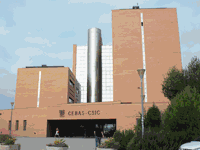
| At CEBAS-CSIC research is oriented towards the conservation of fragile natural resources in Mediterranean ecosystems and the fight against climate change. |
|
Work in natural resources conservation at CEBAS-CSIC is oriented towards the study of soil degradation and recuperation processes in order to contribute to the maintenance of this threatened resource in southeast Spain and to help diminish the effect of climate change. For this, research is performed in three complementary approaches:
- Enzymology and bioremediation of soils and organic wastes.
In enzymology and bioremediation of soil and organic wastes, both basic and applied knowledge on the functioning of ecological, biological and microbiological processes involved in land desertification, degradation and restoration in semi-arid environments are generated, in order to contribute to sustainable ecosystem management. The recycling of organic wastes in degraded soils is practiced as a biotechnological process which can contribute to soil restoration and soil C sequestration, including their application in ecological farming, and as the development of techniques that give value to these wastes.
The sustainability of soil-plant systems is analysed from a multidisciplinary approach. Studies on preparation and evaluation of organic biofertilisers by co-composting of agro-industrial and farming wastes and sub-products are performed. Organic amendments combined with growth-promoting microorganisms are developed, and the use of plants able to exclude or accumulate metals in combination with soil organic amendments for the remediation of heavy metals-contaminated soils is studied. All this work is oriented to increase soil fertility and plant survival in semi-arid zones, in order to maintain soil resources and to mitigate climate change effects.
In soil erosion and conservation, research focuses on the holistic study of soil, water and vegetation in semi-arid ecosystems. Research is aimed at the development of new methodologies for successful reforestation and revegetation of degraded land, with the ultimate goal of establishing a sustainable and multifunctional plant cover. This research will contribute to the development of new approaches to the management of semi-arid zones that are based on a sustainable use of resources. Special attention is given to the study of the relationships between vegetation and the soil, water and carbon cycles, as well as to restoration of degraded resources and mitigation of the negative impacts of global change. |










